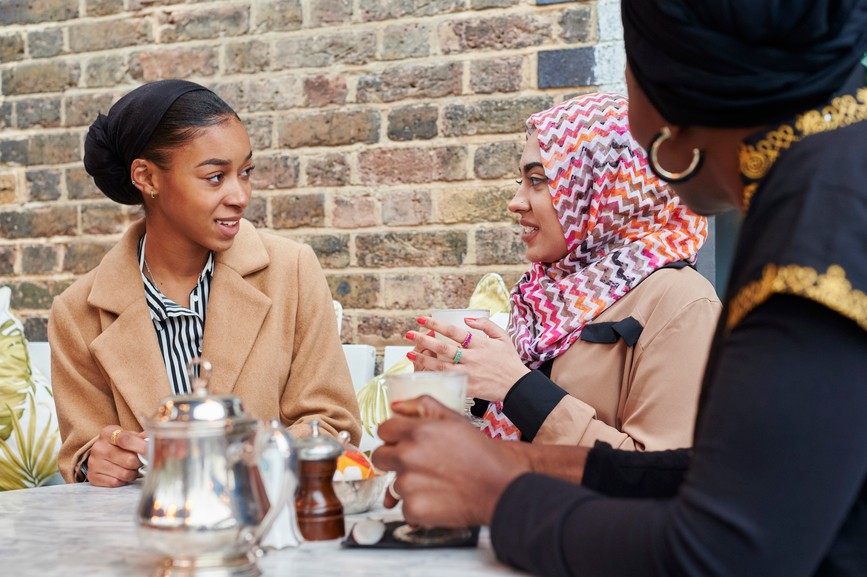Balancing motherhood and self comes very easily to some. I’ve seen many friends give birth, create…
Self-Care
Why It’s So Healing to Tell Your Birth Story and 3 Things You Can Do to Process It
July 26, 2021 • By Anne Omland

With everything that comes with new mom life — sleep deprivation, feeding, healing, adjusting — so many of us never take the time to pause and reflect on what just happened: You gave birth.
Whether yours was traumatic or uncomplicated, birthing another human is a big deal. A very very very big deal. And it’s unfortunate that our society perpetuates the idea that giving birth is an ordinary, run-of-the-mill, everyday event that our bodies were built to endure.
It’s so easy, too easy, for us to breeze past the depth of this experience because everything and everyone is focused on the baby. But you’re a newborn too and deserve the time and space to adjust to this new life too.
Storytelling is how we learn and it’s where we begin.
Think about high school history class. When the teacher made you memorize arbitrary dates, it was torture. But when they told you the story of how Henry The Eighth blew through wives like a newborn blows out pajamas, you remembered everyone’s name. Because it was a fun, compelling story. This is how we connect to ourselves, others, and process events.
When it comes to our birth stories, we can’t process and live at the same time. Telling our birth story, repeating our birth story, helps deepen our understanding of our experience and how we feel about what happened. When we repeat our stories we create deeper neural pathways and connections that can then override our perceived feelings and interpretations. Cool, right?
We can literally change the narrative. We can hold and shift the subconscious messaging in our brains and how we experience our history and our “role” in the story. We can honor what happened, learn from what we wish was different, and use that to inform our future.
Here’s an example of why telling your story out loud multiple times matters.
Before I had my first baby, we moved to a new town and my first new mom friend told me her birth story. The first two times, she painted a scene of ease and acceptance. The third time, things changed. I saw her remembering other details, questioning what happened, and processing parts she hadn’t let herself remember before. Soon she was pregnant again. And this time, when she told me she started shaping how she wanted to experience this second birth. Her hopes and choices became clear.
Ok Anne, I get it, I should start talking through my birth story to help heal myself, my ancestry, and not let this weigh down the rest of my life. But what if I don’t want to? What happens if I don’t tell my birth story?
Like everything else in life, this is your choice. But when we don’t share our stories, when we don’t give ourselves a chance to revisit or process them, we won’t fully heal. Our body stores these unresolved emotions and they can turn into feelings of anxiety, depression, and rage.
Maybe your birth was uncomplicated, traumatic, fast, slow, medicated, or unmedicated. Maybe you had an emergency cesarean, weren’t treated well by your care team, or had your baby in the car on your way to the hospital. There are so many scenarios and none of them are in our control. It makes sense that we need time and space to actually understand what happened.
It is part of the healing process to talk about this. Talk about the transitions, the fears, the dreams. You can tell your story to someone or write it down. Whichever feels like the next right step for you. Moving through the trauma of childbirth (because no matter how you shake it, childbirth is a trauma), is part of the process.
To help you explore this process, here are my recommendations for how to move through and share your postpartum experience.
Breathwork
Harness the power of your breath to literally recalibrate and calm your nervous system. Learn more about box breathing here. This will help ground and center your mind and self.
Tapping
This ancient practice drawing on the body’s meridian points and utilizing acupressure and rhythmic tapping along with mantras helps to shift neural pathways and create new pathways. You can read more about tapping here.
Journal
Make time and do it while it’s fresh. If there are parts you don’t remember clearly, ask your partner, doula, or support person to help you fill in the gaps. You can also ask them to share their perspective if you’re open to that.
Here are some prompts that may help you get started…
- When I gave birth I felt…
- My first thought when I held my baby was…
- The people in the room with me were…and they were doing…
- I was surprised that…
- I felt…
- I was scared that…
- I was excited for…
- That first night was…
- When we got home I felt…
Tell your story
When you are ready, you can read what you wrote out loud. By yourself. Then to someone else. Then to another someone else. You can riff on it. You can ask for feedback or ask a friend to share their story. Or you can submit your story to pstprtm here 😉
You are important. Your story is important. And remember, when you share yours, you invite other birthing people to share their own. That’s the kind of healing ripple effect we’re after.



